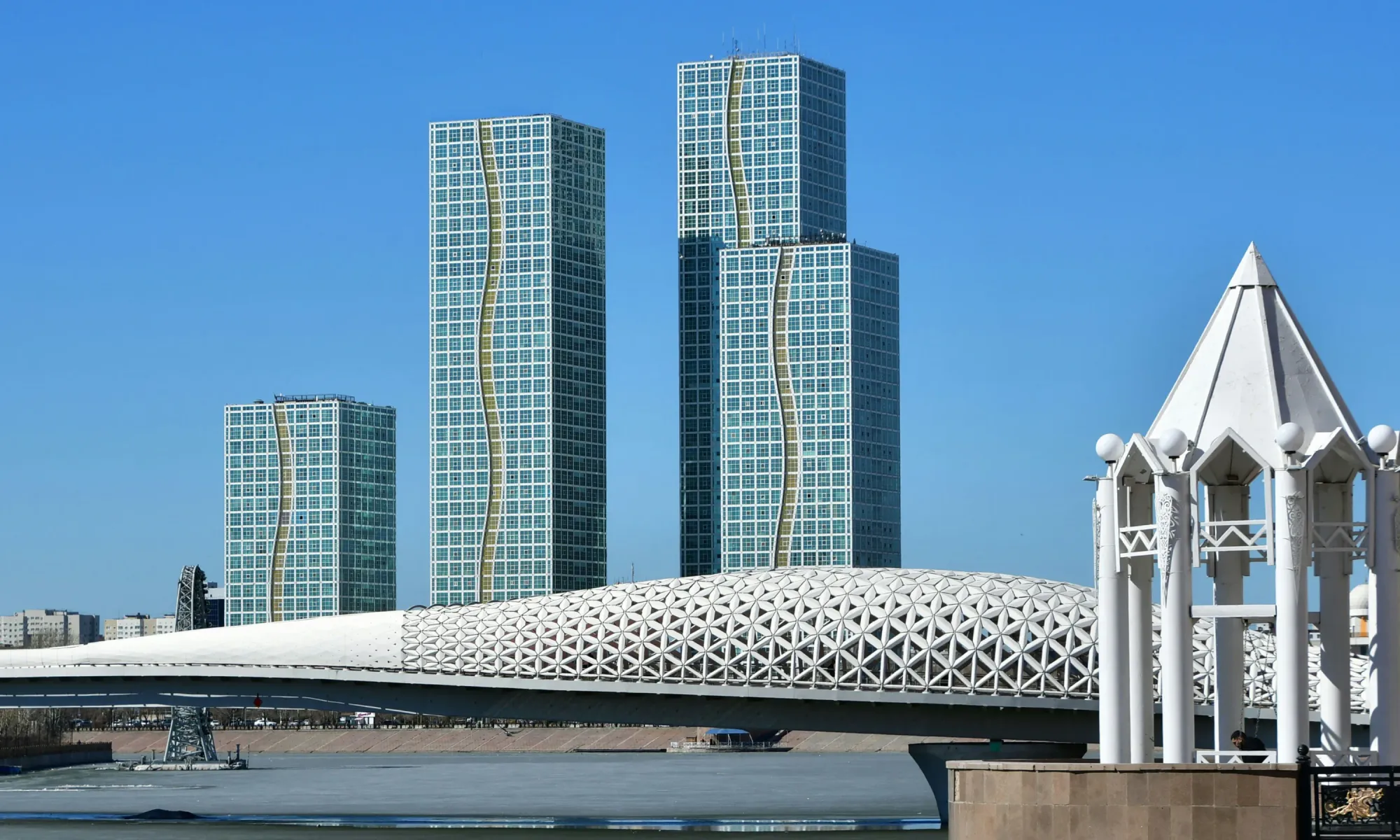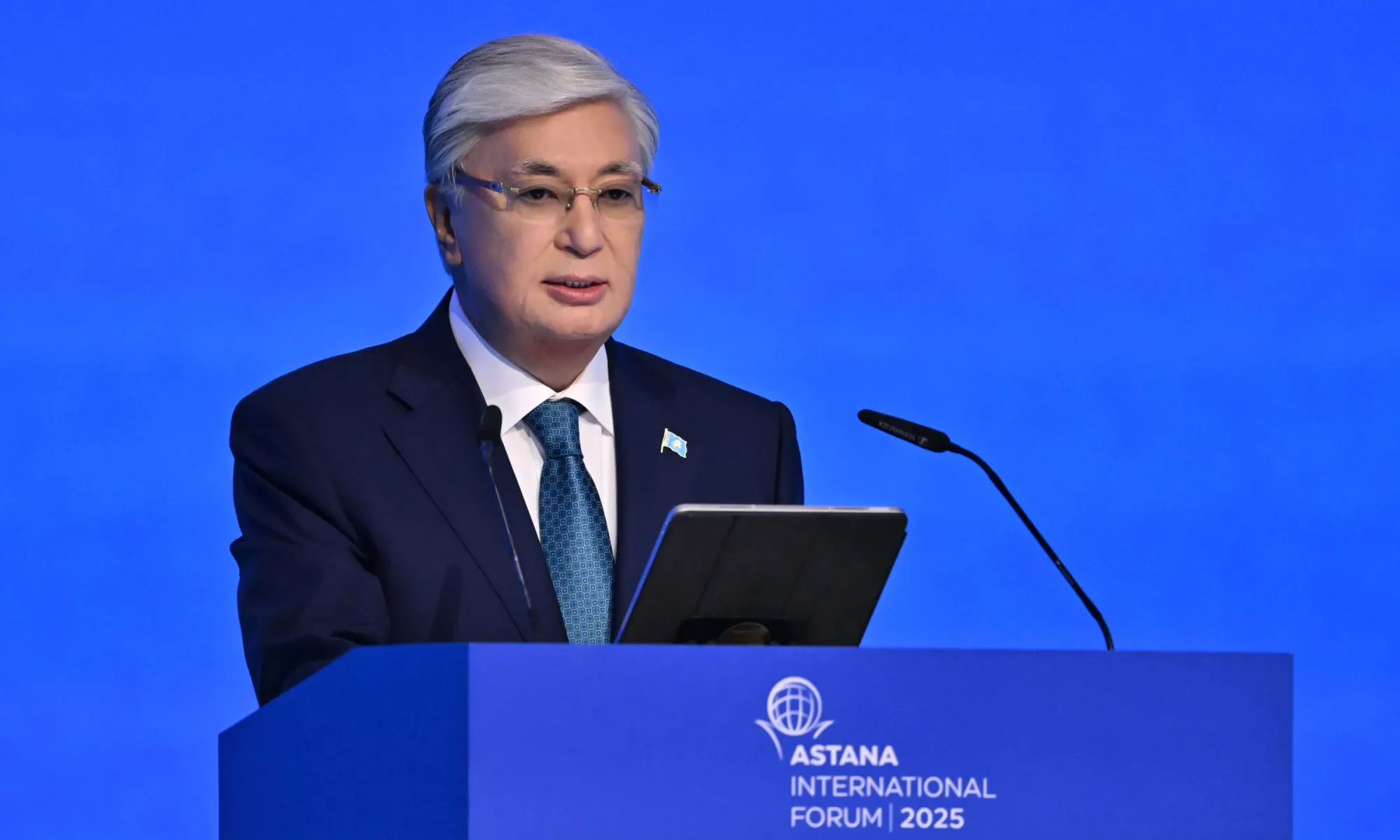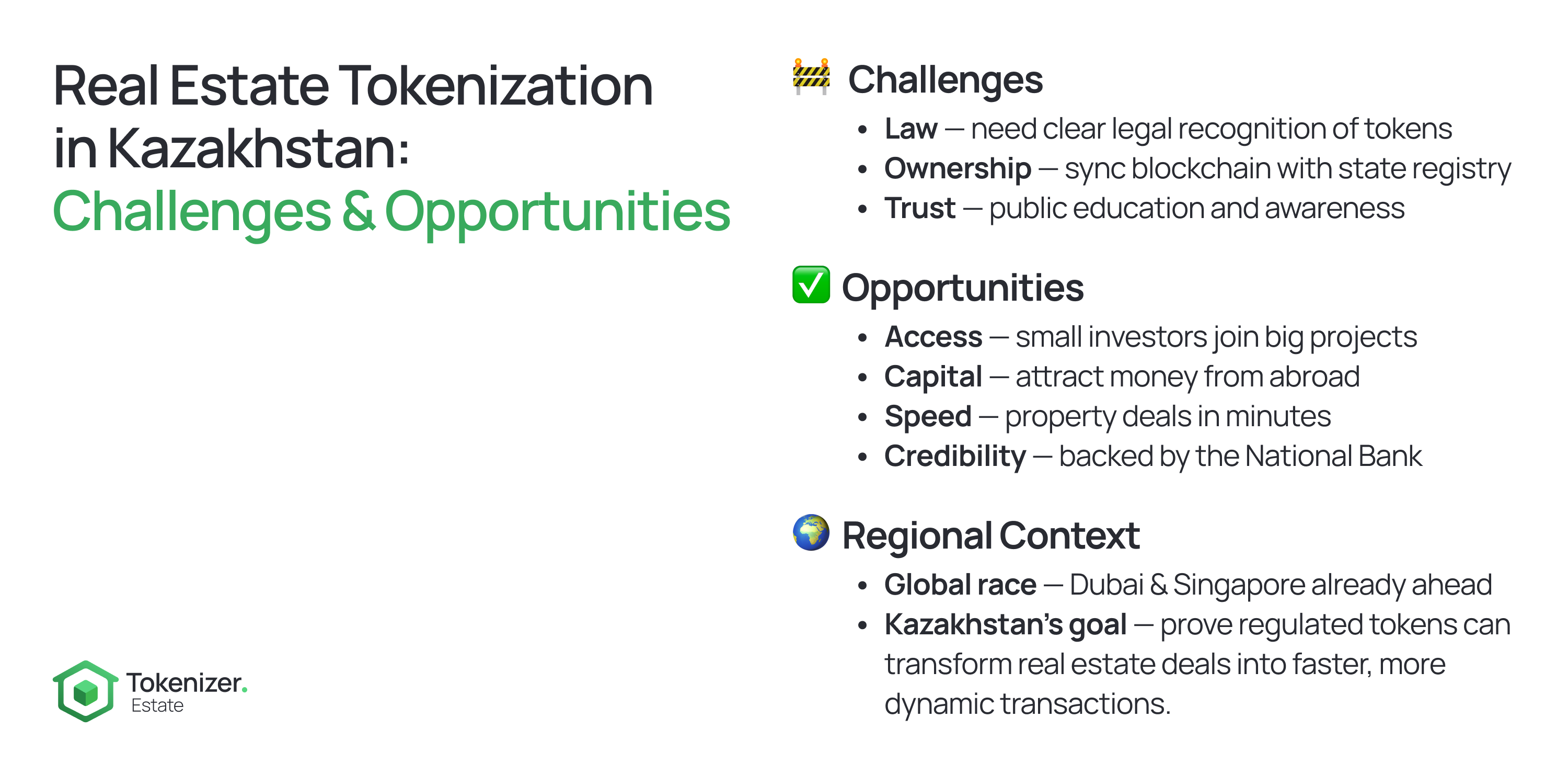Tokenization in Kazakhstan: Small Investments, Big Opportunities
Today we head to Kazakhstan 🇰🇿 — where real estate tokenization is moving from theory to practice.

Imagine if you could own a small part of a new apartment building in Kazakhstan with a modest sum of money. This idea is becoming reality today. Real estate tokenization is a new way of turning property value into many small digital tokens on a secure blockchain. Each token represents a tiny share of a property, letting people invest in real estate with much smaller budgets than needed before.
What Is Real Estate Tokenization?
Tokenization means converting a real asset (like a building or land) into digital tokens recorded on a blockchain. These tokens work like digital shares of the asset. For example, instead of buying an entire apartment, an investor can buy a few tokens that equal a small percentage of that apartment.
The blockchain keeps track of who owns each token, making ownership clear and secure. Tokens can be bought and sold easily, so real estate tokenization makes property investment more liquid (easier to trade) and accessible.
This concept is catching on around the world. In some places, people already trade tokenized pieces of buildings. Dubai is a pioneer – it allows investors to legally buy fractional property shares through secure, regulated blockchain platforms. Japan also moved ahead, with over 70 tokenized real estate offerings launched since 2021 and clear rules that are lowering barriers for investors.
In simple terms, tokenization is opening real estate markets to ordinary people by letting them invest amounts like a few hundred dollars instead of millions.
Why Tokenize Real Estate in Kazakhstan?

For many Kazakhstani citizens, investing in property has been out of reach. Buying an apartment or commercial space requires a large amount of money. Tokenization can change that by allowing fractional ownership.
If a building is broken into 10,000 tokens, someone could buy just a handful of tokens to own a small slice. This means an everyday investor can enter the real estate market with a much smaller sum. It offers a new investment option for people to grow their savings.
Developers and property companies also see benefits. Selling tokens for a building can help raise funds faster and reach more investors.
Instead of relying only on big investors or banks, a developer can attract many small investors from Kazakhstan or even abroad. This can bring more capital into projects and possibly speed up development. Plus, transactions on a blockchain can be quicker and involve less paperwork than traditional real estate sales.
The government of Kazakhstan is interested in these advantages too. It wants to make investing and financing easier while ensuring everything stays safe and legal. Embracing new technology like blockchain could also help Kazakhstan become a regional leader in finance. By being one of the first in Central Asia to support real estate tokenization, Kazakhstan aims to show that it is open to innovation and foreign investment.
Kazakhstan’s First Steps Toward Tokenization

Kazakhstan has started to build a legal foundation for digital assets. In April 2023, a law on digital assets came into effect, which set basic rules for things like cryptocurrencies and tokens.
In mid-2025, President Kassym-Jomart Tokayev took a big step by announcing a project called CryptoCity – a pilot zone to promote crypto and blockchain uses, including buying real estate with digital assets. This top-level support showed a strong political will to explore blockchain solutions in everyday life.
The National Bank of Kazakhstan (the central bank) soon followed with a concrete action. It launched sandbox rules for digital assets in July 2025. A “sandbox” is a special regulatory program that allows testing new technologies under supervision. Within this sandbox, companies can experiment with things like real estate tokens under monitored conditions. The idea is to try innovative services in a safe way before fully changing the laws for everyone.
Crucially, the sandbox’s first round of pilot projects included real estate tokenization as a key area. This means developers are now allowed to issue digital tokens that prove ownership of real estate, all within the sandbox framework. By doing so, the authorities can study how tokenized real estate works in practice – how trades happen, how to protect investors, and what legal adjustments might be needed.
The First Tokenized Property Deals

Kazakhstan is moving from theory to practice via sandbox pilots tied to real assets. In these pilots, tokens represent fractional interests and are issued and traded under the sandbox’s oversight, with parameters such as minimum ticket size set by the respective platform and offer terms rather than a nationwide mandated amount. This keeps access flexible while the regulator studies outcomes and risks.
Officials have said that the results of these pilots will guide a full law next year. If all goes well, Kazakhstan plans to introduce permanent legislation to allow wider real estate tokenization based on the lessons learned.
To make these tokenized deals work smoothly, some special arrangements are in place. Property titles (the official ownership documents) are kept in a special registry during the sandbox. This ensures that even though many people might own tokens of a building, the legal title is tracked and secure.
The blockchain smart contracts – basically self-executing programs – handle tasks like distributing rental income to token holders. The regulator hopes this model will cut paperwork and widen access to income-producing real estate across the country.
One local startup, for example, received the green light to run a tokenization platform through this sandbox. It created a website where investors can buy tokens linked to real apartments and commercial spaces.
Each token gives the holder a right to a share of rental income and a portion of the property’s future sale value. This platform was incubated in a local tech hub and became the first to operate under the National Bank’s special regime. Such pioneers are showing how the theory of tokenization can work in real life.
Support from Officials and Regulations

Kazakhstani regulators are carefully watching these early projects. The Deputy Governor of the National Bank, Berik Sholpankulov, highlighted that the sandbox lets market players test bold ideas in a controlled environment. He noted that the first real estate pilots should “show ordinary citizens new ways to invest without huge entry costs.” This underscores the main goal: making investment opportunities more inclusive while ensuring they are safe.
According to the central bank, the first batch of sandbox participants includes three platforms working on real estate tokenization (alongside pilots like stablecoins and crypto exchanges), and over 15 additional projects are under review as of mid-2025, meaning the interest in digital assets is quite high. This diverse participation will help regulators understand different aspects of tokenization, from technical details to investor behavior.
The government’s support goes beyond just the central bank. The President’s CryptoCity initiative is part of a vision to turn Kazakhstan into a hub for blockchain innovation. In that pilot zone, authorities even talk about enabling on-chain home sales (selling houses via blockchain) and using cryptocurrencies for everyday purchases. All these efforts align with a broader strategy: to position Kazakhstan as a leader in digital assets.
Officials emphasize that Kazakhstan has a unique combination of modern rules, good digital infrastructure, and strong political will, which could make the country a global hub for digital assets in the coming years.
Moving Forward: Challenges and Opportunities

While the early results are promising, there is still work to be done before tokenization becomes mainstream in Kazakhstan. The sandbox approach means that for now, only approved pilots can operate, and they must follow strict guidelines. This cautious strategy is wise, as it allows any bugs or legal issues to be discovered and fixed on a small scale.
For full roll-out, the parliament will likely need to pass new laws or amend existing ones to recognize tokenized property rights formally. That is expected to happen after the sandbox phase, using insights from the pilots.
One challenge is ensuring that token ownership truly equals legal ownership in a clear way. Buyers need confidence that owning a token is as solid as owning a portion of the property through traditional means.
This will require tight integration between blockchain records and government property registries. It’s a technical and legal puzzle, but the sandbox tests are already addressing it by linking tokens with a special registry and involving notaries and developers in the process.
Another challenge is public awareness and trust. Real estate tokenization is a new concept for most people. There might be initial skepticism about buying digital tokens instead of a physical deed.
Education will be important to show how blockchain makes the process secure and transparent. Over time, as success stories emerge (for instance, people earning rental income from tokenized apartments), trust is likely to grow. The fact that these projects are being conducted under the eye of the National Bank also adds credibility and comfort for the public.
The opportunities, on the other hand, are significant. If Kazakhstan proceeds to enact friendly tokenization laws, it could unlock a wave of property investment. Local real estate projects could attract small investors not just domestically but also from neighboring countries. It could become easier for a young family in Almaty to invest a little money in a commercial building and earn steady income from it.
At the same time, a farmer or a teacher could buy tokens in a shopping mall project and benefit from the growth of the retail sector. This democratization of real estate investment can spread wealth-building opportunities more widely among the population.
There is also a regional competitive angle. Countries around the world are racing to adopt blockchain in finance. Dubai and Singapore are already trading tokenized towers, and Kazakhstan does not want to fall behind. In fact, analysts say Astana’s goal is to prove that regulated tokens can move property deals from months to minutes.
Traditional property sales can take weeks or months due to paperwork and approvals. But with blockchain, once everything is legally set up, trading a token that represents a property share can be as fast as an online bank transfer. This speed could make Kazakhstan’s real estate market more dynamic.
Conclusion

Kazakhstan is entering a new era of real estate investment through tokenization. What started as a bold idea is now being tested on the ground with actual properties and real investors. Early moves like the sandbox show that it’s possible to buy and sell slices of property in a safe, regulated way.
The language may sound technical, but the outcome is simple: more people can invest in real estate, and developers have new ways to raise money.
If the upcoming laws solidify these experiments, Kazakhstan could become a leader in real estate tokenization, not just in Central Asia but globally. The country’s mix of innovation-friendly policies and cautious regulation is building confidence among market players.
In very clear terms, tokenization in Kazakhstan means small investments leading to big opportunities. A security guard, a school teacher, or a young entrepreneur might soon all be able to own a piece of a building and share in the wealth it generates. By embracing this trend, Kazakhstan is opening the doors of its property market to everyone, one token at a time.

